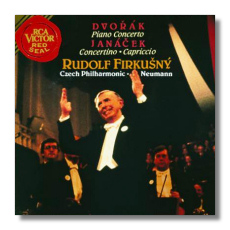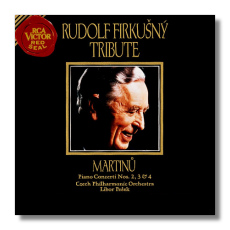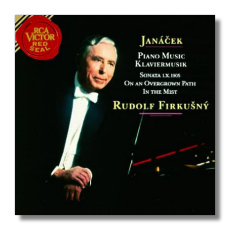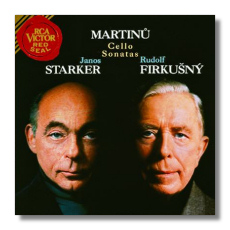
The Internet's Premier Classical Music Source
Related Links
-
Dvořák Reviews
Janáček Reviews
Martinů Reviews - Latest Reviews
- More Reviews
-
By Composer
-
Collections
DVD & Blu-ray
Books
Concert Reviews
Articles/Interviews
Software
Audio
Search Amazon
Recommended Links
Site News
 CD Review
CD Review
RCA - The Firkušný Edition

- Antonín Dvořák: Piano Concerto
- Leoš Janáček:
- Concertino for Piano & Chamber Ensemble *
- Capriccio for Piano & Chamber Ensemble **
Rudolf Firkušný, piano
Czech Philharmonic Orchestra/Vaclav Neumann
* Josef Kroft & Jan Buble, violins
* Jan Marck, viola
* Zdeněk Tesar & Ivan Doksansky, clarinets
* Jiří Seidl, bassoon
* Zdeněk Tylsar, French horn
** Radomir Pivoda, flute & piccolo
** Zdeněk Sedivy & Jiří Sedivy, trumpets
** Jaroslav Kisy & Jiří Odchazel, trombones
** Jaroslav Tachovsky, tenor tuba
RCA 09026-60781


Bohuslav Martinů
- Piano Concerto #2 (1934)
- Piano Concerto #3 (1948)
- Piano Concerto #4 "Incantations" (1956)
Rudolf Firkušný, piano
Czech Philharmonic Orchestra/Libor Pešek
RCA 09026-61934


Leoš Janáček
- Piano Sonata #1
- "On an Overgrown Path" Books 1-2
- "A Recollection"
- "In The Mist"
Rudolf Firkušný, piano
RCA 09026-60147
These are listed in the order in which I became familiar with them. Notice the weird instrumentation in the Janáček Capriccio.
Let's start with the Dvořák, probably the most familiar to you. If you have not heard this concerto, you should. It is full of the melodies that you will find familiar to the Dvořák style. Now, if you have not heard Firkušný in this piece you really haven't heard it at all. For all his recordings of other composers (as mentioned above) Firkušný excels in the music of his countrymen. He has a delicate riffle he uses in his right hand that lends a touch of magic to the performance. Neumann matches the brilliance of the performance and the Czech Philharmonic play this music as no other orchestra can. My previous favorite recording is with Moravec. That, too, is an excellent recording (Supraphon 110675-2) with Jiří Bĕlohlávek conducting. That disc is coupled with a good recording of the Dvořák Symphony #7. Somehow, though, perhaps it was the general atmosphere of Firkušný's return to his native country, the gestalt of this performance is amazing!! This is a classic case of where the excellent is the enemy of the very good.
The couplings on this CD are also fascinating. The music of Janáček has a Czech flavor somewhat more dissonant than Dvořák. It seems more derived from folk music of the country. You may be familiar with the composer's Sinfonietta or Taras Bulba and these chamber works are from the same pen. It is delightful music that is odd but enchanting. The instrumentation should be enough to tell you that you will hear music unlike what you have gotten used to. Here, again, Firkušný works his magic. I compared this recording of the Concertino with a Decca recording I have, András Schiff at the piano. Well, there is simply no contest here. Firkušný finds so much more music in the notes that it almost sounds like a different piece.
Now to Martinů. I have written elsewhere that we live in a unique age in the history of classical music. Until the invention of the gramophone the only way to hear classical music was to go to a concert or perhaps the house of musicians and listen to the music there. Another option, of course, would be to play an instrument yourself. Today we can choose what we want to hear, when we want to hear it and repeat it as much as we want. I am convinced that Martinů is one of the greatest composers of the 20th century, greater than Mahler. On the other hand, I believe that his music may be more suited for the recording medium than the concert hall. There is so much going on in any Martinů piece that sitting in a concert hall could not possibly capture it all for you. If you acquire the taste for his music you want to hear it again and again. What is it like? A friend of mine said, on his first acquaintance with Martinů, that the music reminded him of Stravkinsky. Another critic has described it as Dvořák meets Stravinsky. I am not sure I agree with this assessment, but it has some validity. It might be helpful to know that Martinů was influenced by Roussel and the last three of Roussel's Symphonies are obviously the root of Martinů's. Martinů's music is also indicative of Janáček. If I am belaboring a point it is because I am trying to give you some idea what you are in store for.
Martinů lived from 1890-1959. Much of his life, however, was spent away from his native Czechoslovakia. He moved to Paris in 1923 and worked with Roussel, but was largely an autodidact in his learning. World War Two forced Martinů to flee Paris and he emigrated to the United States. Almost all of this symphonies were composed when he lived in the United States, as were many of his other pieces.
The piano concerti here were my introduction to Martinů. All three concerti were written for Firkušný, and the Third was dedicated to him. To be honest, I listened to this music with the headphones on the first time and it blew me away! My notes are an almost helpless string of comments. One that keeps creeping up is, "This sounds like the music of a brain in synapse." Delicate finger filigrees dance about like fireflies on an August evening. The music broods at times, but there is a Czech folk atmosphere always present. This may sound a bit odd when you consider, as mentioned, that much of what Martinů wrote was done in Paris or the United States but Martinů must have had the Czech music in his blood.
I had hoped to crib from the insert notes to offer some ideas about these concerti, but the booklet contains a lengthy biography of Firkušný and nothing about the music. This is the only reservation about this disc. Concerto #2 opens with an almost cinematic grandeur that will recall Dvořák, but then it quickly turns to the quirky Martinů melodies. The slow movement, as often in Martinů, has an almost Twilight Zone atmosphere to it. The third movement returns to the opening melody but now it is transformed, somehow incorporating Dvořák and Martinů's sound world. Number 3 opens darkly, almost Russian in flavor, but the quirky nature of Martinů haunts the background. Of the three concerti here, this is still the "most serious" in nature. Incantation may remind you of Ravel's piano concerto at moments, but then it takes off on its own. The interplay of harp, piano and orchestra at times seems to swirl like bubbles in ginger ale. This is swirling texture is one of the themes that Martinů uses frequently in his music. Then there are quirky touches in the last movement that perk up your ear and bring a smile to your face. Firkušný and Pešek play this music so well that this has to be a touchstone for all future recordings.
On to the Janáček disc. Here, again, I was able to make a comparison with the Decca recording with Schiff. Here, again, there is no contest. Firkušný worked with Janáček and in On an Overgrown Path you can hear the difference between knowing the work from the inside as contrasted with knowing it from the outside. The music has an almost child-like charm to it. Still, there are the delightful surprises that spring up to charm you, much like in Martinů.
Then there are the cello sonatas, written in 1939, 42 and 52. If I had to recommend one place to start with Martinů, it would be with this disc. Here the tapestry that Martinů weaves contains all his disparate elements, but the brush strokes are done with fewer brushes and it may be a bit easier for you to penetrate the sound world of Martinů. János Starker and Firkušný play together like hand-in-glove. All three are fascinating, but I particularly like the 3rd. There is a nobility, a poignancy, a melancholy here that is in fitting with its tribute to the death of a fellow expatriate, Hans Kindler.
I am working on an essay about Martinů which will attempt to examine much of his music in more depth than here. Trying to keep this about Firkušný, however, I can simply say that Rudolf Firkušný was born to play the music of Janáček and Martinů. If you have not heard Firkušný in these works, you have not really heard them at all. These RCA discs belong in the collection of any serious record collector.
Copyright © 1995, Robert Stumpf II




















